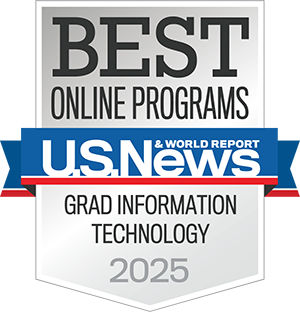Gain Hands-On Expertise in Healthcare IT
Available online, on campus, and in a blended format, the Master of Science in Computer Information Systems concentration in Health Informatics at Boston University’s Metropolitan College (MET) is designed to immerse you in the fast-paced world of technological innovation—preparing you for IT leadership and artificial intelligence-integrated positions in the healthcare sector.
Program at a Glance
- Top 10 Online Program since 2014
- Online, On Campus, and Blended
- Part-Time or Full-Time Study
- STEM Designated
- 32 Units
- 8–16 Months to Completion
- 19 Core Faculty
- No GRE/GMAT
- Tuition & Fees—Part-Time Study*: $25,452
*Based on 2025–2026 Boston University tuition and fees. Merit scholarship may reduce cost.
Advance Your Career with a Master’s in Computer Information Systems
In 2024, research firm MarketsandMarkets projected that the North American healthcare IT market would be valued at $439.09 billion by 2030, with a compound annual growth rate of nearly 14 percent for the period of 2024 to 2030. For those who have the combination of healthcare knowledge and IT skills, there are a multitude of opportunities.
BU MET’s MS in Computer Information Systems concentration in Health Informatics provides an interdisciplinary, integrated approach to the field, and draws on the expertise of Boston University faculty in computer science, medicine, and biomedical engineering. Access to BU MET’s Health Informatics Research Lab (HILab) allows you to tap into collaborative research and development in health informatics, bioinformatics, and clinical research. Graduates of the MSCIS Health Informatics concentration are prepared for roles such as clinical application developer, health informatics specialist, health information technician, health information manager/director, clinical data analyst, privacy officer, software developer/engineer working on health-related information systems, EHR system integration specialist, and many others.
BU MET’s Health Informatics Program by the Numbers
- 68% of students graduating from Fall 2023 through Summer 2024 were employed within 1 year
- 96% of students starting Fall 2023 through Summer 2024 registered for a subsequent semester and 93% registered for the next academic year
- 70% of students entering the program in 2020 - 2021 have graduated as of 2024 – 2025
- 96% of students responded with a 3 or higher on a scale from 1-5 from Fall 2023 through Summer 2024 course evaluations
Accreditation Statement
The Health Informatics accreditor of Boston University’s Metropolitan College is the Commission on Accreditation for Health Informatics and Information Management Education (CAHIIM). The College’s accreditation for the master’s degree in Computer Information Systems, Health Informatics concentration, has been reaffirmed through 2027. All inquiries about the program’s accreditation status should be directed by mail to CAHIIM, 200 East Randolph Street, Suite 5100, Chicago, IL, 60601; by phone at (312) 235-3255; or by email at info@cahiim.org.
What Is My Career Outlook as a Graduate of This Program?
897,028
Total number of US Jobs
104,215
Annual job openings
+3.9%
Annual job openings
16%
Projected ten-year growth in jobs
(faster than average)
$115.8K
Median annual salary
Common job titles include:
- Chief Medical Information Officer (CMIO)
- Clinical Application Developer
- EHR Application Specialist
- Quality Officer
- Safety/Privacy Officer
- Health Informatics Data Manager
Employers seek expertise in:
- Python
- Software engineering
- SQL
- Data analytics
- EHR knowledge
- Cybersecurity

“The knowledge and skills I have learned at BU MET have created more possibilities for me. The computer science skills I have learned, such as Python, Java, SQL etc., and the accumulated knowledge of healthcare information will help me pursue a career related to data analytics, such as a healthcare data analyst. In addition to seeking a job in the field of data analytics, I plan to be involved in some research related to healthcare systems.” Read more.
Zhidong Wu (MET’21)
Senior Lead Generation Specialist II, Biocytogen
MS, Computer Information Systems; Concentration, Health Informatics
Why BU’s Computer Information Systems Degree Has Been Top 10 since 2014
- Accreditation: BU’s master’s degree concentration in Health Informatics is the first such program in New England to be accredited by the Commission on Accreditation for Health Informatics and Information Management Education (CAHIIM).
- Recognized & Certified: Boston University is recognized by the National Security Agency and the Department of Homeland Security as a Center of Academic Excellence (CAE) in Cyber Defense and Research.
- Exam Eligibility: Completion of the CAHIIM-accredited master’s program entitles you to sit for professional certification exams offered through the American Health Information Management Association (AHIMA), such as the Certified Professional in Health Informatics (CPHI™) and the Certified Health Data Analyst (CHDA®) exams. Along with demonstrating a high standard of proficiency and professionalism sought by employers, AHIMA certification ensures access to valuable networking resources, opens the door to higher earning potential, and paves the way for long-term leadership opportunities in the field.
- Active Learning Environment: BU MET’s Computer Information Systems courses introduce case studies and real-world projects that ensure you gain in-depth, practical experience with the latest technologies—and you have access to BU MET’s Health Informatics Research Lab (HILab), which focuses on collaborative research and development in health informatics, bioinformatics, and clinical research.
- Career Counseling: MET’s Career Development office and BU’s Center for Career Development offer a variety of job-hunting resources, including one-on-one career counseling by appointment for both online and on-campus students.
- Engaged Faculty: In BU MET’s Computer Information Systems master’s program, you benefit from working closely with highly qualified Boston University faculty and industry leaders in computer science, medicine, and biomedical engineering.
- AI-Integrated: Many courses prepare you to leverage artificial intelligence for the analysis, development, and integration of modern information systems.
- Extensive Network: Study information systems alongside peers with solid business experience, learn from faculty who have valuable IT contacts across several sectors, and benefit from an alumni community with strong professional connections.
- STEM Designated: Eligible graduates on student visas have access to an Optional Practical Training (OPT) of 12 months and an extension for up to 24 additional months.
- 24:1 Average Class Ratio: Enjoy an exceptional student-to-instructor ratio, ensuring close interaction with faculty and access to support.
- Valuable Resources: Make use of Boston University’s extensive resources, including the Center for Career Development, Educational Resource Center, Fitness & Recreation Center, IT Help Centers, Mugar Memorial Library, Howard Thurman Center for Common Ground, George Sherman Union, Rafik B. Hariri Institute for Computing and Computational Science & Engineering, and many others.
- Flexible Options: Study at the pace that works for you, evenings on campus, fully online, or in the blended format that combines on-campus and online learning. Courses begin fall, spring, and summer; online courses have two starts per term.
- Track Record: Learn from the best—BU MET’s Department of Computer Science was established in 1979 and is the longest-running computer science department at BU. Over the course of its existence, the department has played an important role in the emergence of IT at the University and throughout the region.
- Merit Scholarships: All graduate students are automatically considered for merit scholarships during the application process and nominated based on eligibility. Learn more.
Rankings & Accreditations

#10, Best Online Master's in Computer Information Technology ProgramsMET’s online master’s degrees in computer information technology are ranked #10 in the nation by U.S. News & World Report for 2025.

CAHIIM AccreditedBU MET’s MS in Health Informatics and MS in Computer Information Systems concentration in Health Informatics are accredited by the Commission on Accreditation for Health Informatics and Information Management Education (CAHIIM).
Master the Tools to Excel in Computer Information Systems
The Health Informatics concentration is part of BU MET’s MS in Computer Information Systems (MSCIS) degree program. BU’s industry-leading MSCIS curriculum combines in-depth technical skills and emerging technology management. The Health Informatics concentration provides advanced knowledge of the functionality, technical infrastructure, and best-practice deployment of healthcare IT, including medical algorithms, electronic health records (EHRs), clinical decision support, interoperability, data privacy and security, and regulations. You’ll also look at the American healthcare system, along with the fundamentals of medical terminology, anatomy and physiology, and disease processes, diagnostic modalities, and treatments.
With eight concentrations, the Computer Information Systems master’s encompasses several other fast-growing and well-paid segments of the IT job market, providing the foundation for work as an application analyst, computer and information systems manager, data analyst, data scientist, cybersecurity analyst, IT consultant, network and computer systems administrator, computer systems analyst, database administrator, and many other integral positions in an organization.
Graduate with Expertise
In addition to the learning outcomes derived from Metropolitan College’s Computer Information Systems master’s degree program, the concentration in Health Informatics will equip you to:
- Understand the lifecycle of healthcare information system (HCIS) acquisition, development, implementation, and support.
- Comprehend key healthcare delivery workflows, analyze how HCIS changes those workflows, and manage these changes.
- Lead health IT initiatives; engage in biomedical research; and design, implement, and manage advanced IT solutions.
Certificate-to-Degree Pathway
You can also earn the master’s in Computer Information Systems with a concentration in Health Informatics by completing the BU MET Graduate Certificate in Information Technology and Graduate Certificate in Health Informatics, plus one additional course—either Information Structures with Java (MET CS 520) or Information Structures with Python (MET CS 521). Students currently enrolled in a graduate certificate who are interested in transitioning into a master’s degree should contact their academic advisor to declare their interest in this pathway. A new master’s degree application is not required. Connect with a graduate admissions advisor at csadmissions@bu.edu to learn more about this option.
Master’s in Computer Information Systems Curriculum
Health Informatics Concentration
A total of 32 units is required.
Students must complete the core courses and Health Informatics concentration requirements.
For students who matriculated before Fall 2025 and wish to continue with the previous curriculum, check the following link for the degree requirements: 2024–2025 MSCIS Degree Requirements.
Prerequisites and Corequisites
Applicants to the program are required to have a bachelor’s degree in any discipline from a regionally accredited institution. Students with limited academic background in information technology or computer science may be required to enroll in the following complimentary lab. Recommendations will be provided upon admission.
Prerequisite:
- MET LB 102 Introduction to Computer Information Systems
All students are required to enroll in the following complimentary labs, regardless of their background. These labs can be taken simultaneously while enrolled in the MSCIS program.
Corequisites:
- MET LB 103 Core Mathematical Concepts
- MET LB 104 Foundations of Probability
Core Courses
(Four courses/16 units)
One of the following:
MET CS 520 Information Structures with Java
MET CS 521 Information Structures with Python
And these three courses:
MET CS 625 Business Data Communication and Networks
MET CS 669 Database Design and Implementation for Business
MET CS 682 Information Systems Analysis and Design
Students who have completed courses on core curriculum subjects as part of their undergraduate degree program may request permission from the Department of Computer Science to replace the corresponding core courses with graduate-level computer information systems electives. Please refer to the MET CS Academic Policies Manual for further details.
Concentration Requirements
(Four courses/16 units)
MET CS 570 Biomedical Sciences and Health IT
MET CS 580 Health Informatics
MET CS 581 Health Information Systems
MET CS 781 Advanced Health Informatics
Master’s Thesis Option
(8 units)
Students have the option to complete a master’s thesis in addition to the program’s eight course (32 unit) requirements. The thesis option is to be completed within twelve months and is available to Master of Science in Computer Information Systems candidates who have completed at least four courses toward their degree and have a GPA of 3.7 or higher. Students are responsible for finding a thesis advisor and a principal reader within the department. The advisor must be a full-time faculty member; the principal reader may be part-time faculty with a PhD (unless waived by the department).
Computer Science Faculty
View All Faculty
Tuition & Financial Assistance
Competitive Tuition
Our part-time rates are substantially lower than those of the traditional, full-time residential programs yet provide access to the same high-quality BU education.Comprehensive Financial Assistance
Our services include scholarships, graduate loans, and payment plans.How Much Does This Program Cost?
BU MET programs offer the flexibility of part-time or full-time study, either on campus or online. Tuition, fees, and total program cost are determined by enrollment status. If you enroll in 1–2 courses (4–8 units) in a semester, you are charged the part-time per-unit rate. If you enroll in 3–4 courses (12–16 units) in a semester, you are charged the full-time semester rate.
MS in Computer Information Systems, Health Informatics Concentration (Online and On Campus)
| Enrollment Status | Part Time | Full Time | |
| Courses per Semester | 2 courses (8 units) |
4 courses (16 units) |
3 courses (12 units) |
| Time to Degree | 4 semesters (16 months) |
2 semesters (8–12 months)*** |
3 semesters (12–16 months)*** |
| Tuition* | $567–$1,005 per unit** |
$34,935 per semester |
$34,935 per semester |
| Fees per Semester* | $75 | $501 | $501 |
| Total Degree Cost* | $25,452 | $70,872 | $78,987 |
*Based on 2025–2026 Boston University tuition and fee rates.
**Cost per unit is determined by course number (100–599 = $567/unit, 600–999 = $1,005/unit).
***Summer semester enrollment is not required for international students to maintain F-1 visa status. Enrollment in summer semester coursework will expedite completion of program and reduce total program cost.
International students seeking an F-1 visa for on-campus study must enroll full time and demonstrate availability of funds to cover the Estimated Cost of Graduate Study; those who wish to study online may enroll part-time but are not eligible for a visa. Learn more about International Student Tuition & Fees.
Questions? Please contact us to hear from an Admissions Advisor who can help you determine the best enrollment pathway. For information regarding financial aid, visit BU MET’s Financial Aid page.

Get Started
Please visit the BU MET admissions page for details on how to apply, financial assistance, tuition and fees, requirements for international students, and more.
What to Read Next: MET Computer Science & IT Knowledge Center
- Computer Science & IT Student Stories
- How Long Does a Master’s in Computer Science Take to Complete—and What is the Cost?
- Why Get a Master’s Degree in Computer Science at BU MET?
- What Do My Career Options Look Like with a Master’s in Computer Science from BU’s Metropolitan College?
- Are There Different Computer Science Graduate Programs or Specializations at BU?






















